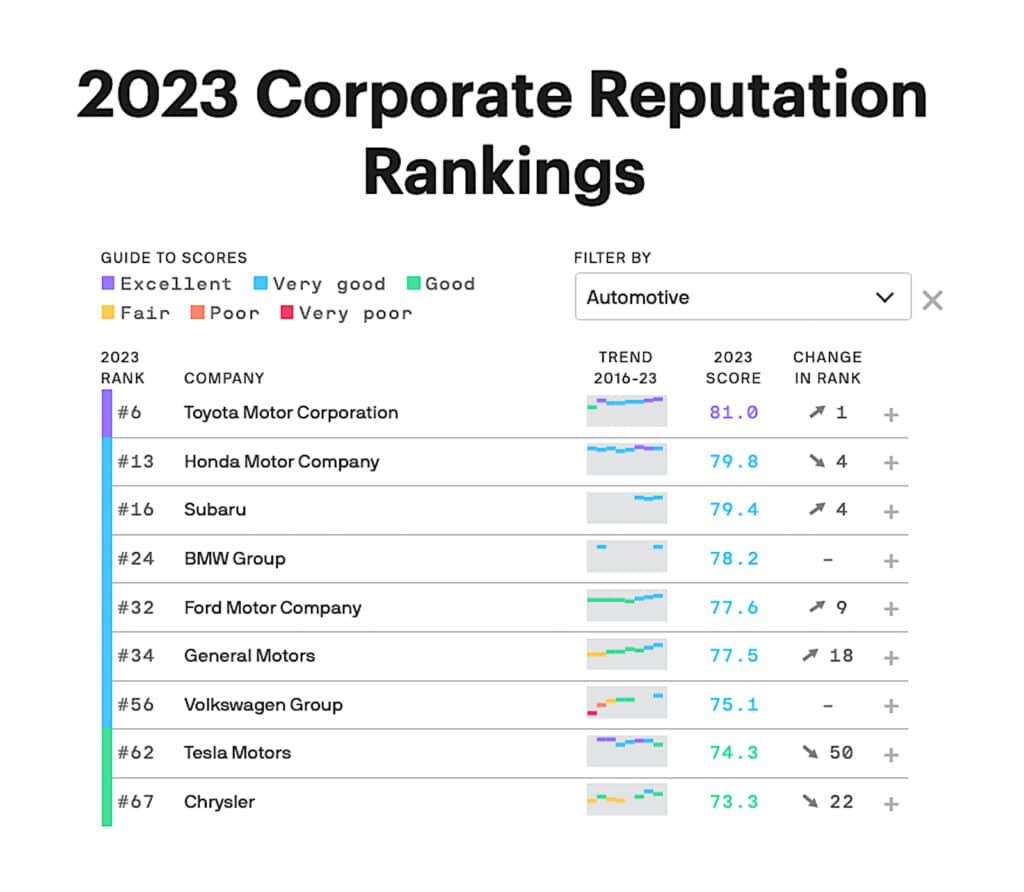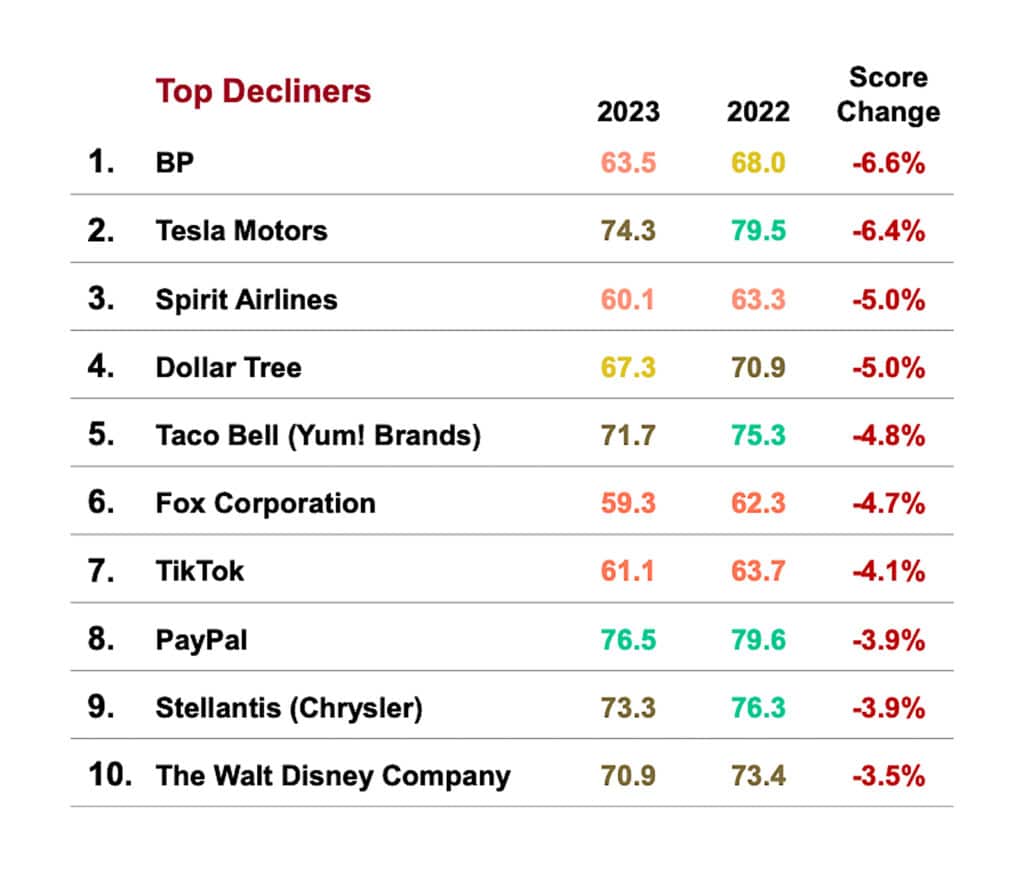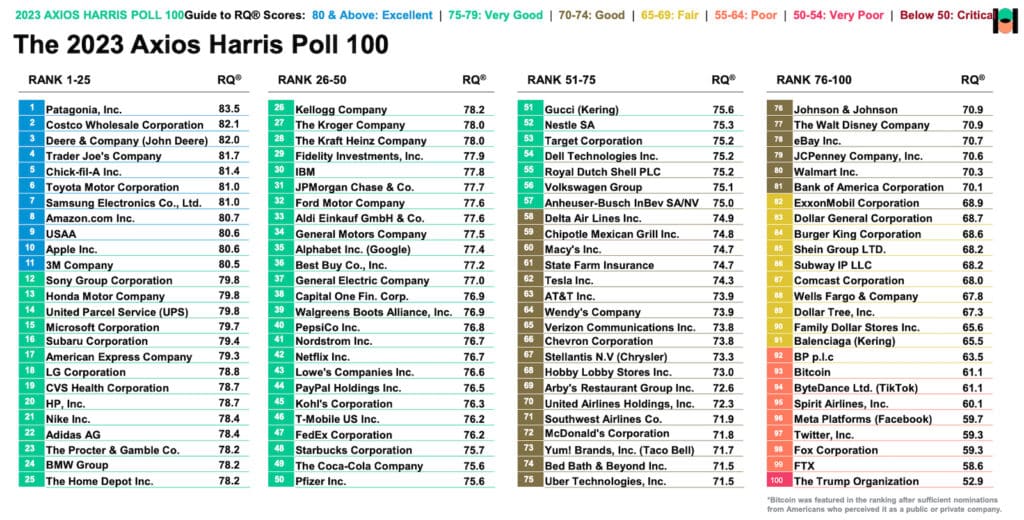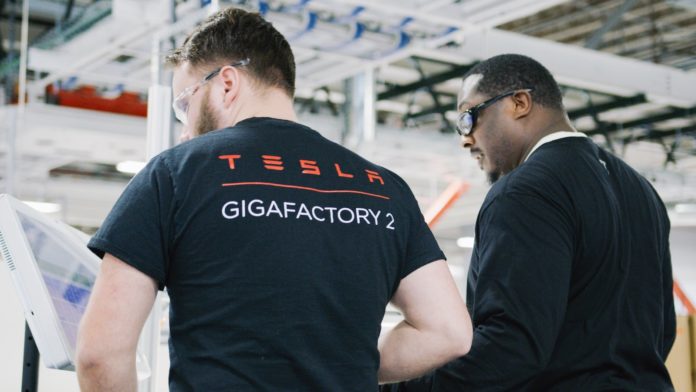Burdened by a variety of problems, including its CEO’s controversial takeover of Twitter, Tesla took a major dip in the annual Axios Harris brand reputation survey — a plunge that could weaken its appeal in the emerging EV market.
Ranking as high as eighth in the Axios Harris Poll 100 results as recently as 2021, Tesla fell to 62nd in the study this year, well behind competing manufacturers such as Toyota, BMW, Ford and General Motors. The sharp downturn comes at a time when those and other automakers are starting to flood the market with EVs meant to challenge Tesla’s lead in the battery-electric space.
“The world’s leading electric vehicle company is defined by its billionaire CEO, whose messy takeover of Twitter, along with his unfiltered online persona, may have caused collateral damage to other parts of his empire,” Axios said in a summary of Tesla’s performance in the latest brand reputation survey.
A near-record plunge
According to Axios Harris, Tesla fell 50 spots in the study, plunging from 12th in 2022, to 62nd this year. The automaker lost ground in all nine of the attributes pollsters looked at, with the sharpest declines coming in character, trust, culture and ethics, the summary noted. Respondents were kinder in categories including trajectory, vision, and products and services, though its scores were also down from last year.

The plunge was the worst any automaker has experienced during the nearly quarter-century of reputational polls by Harris — surpassing even the damage suffered by Volkswagen when it was revealed the German automaker cheated on diesel emissions tests in 2015.
VW solidly outscored Tesla in the new study, as did automakers including Honda, Subaru, BMW, Ford and GM. Toyota was the highest-ranked brand among motor manufacturers, ranking sixth.
That could pose problems for Tesla at a particularly critical moment when the auto industry is undergoing massive change. Battery-electric vehicles have gone from a fringe segment of the market to become increasingly mainstream.
EVs accounted for less than 1% of total U.S. new vehicle sales in 2019 to 5% for all of 2022. So far this year, the segment has reached as high as 8%, reported J.D. Power, though demand appears to be slipping a bit due to changes in the rules governing federal EV incentives.
A critical moment
Meanwhile, the number of players in the segment has mushroomed, everyone from Mazda to Maserati rolling out all-electric models. Based on research by TheDetroitBureau.com, there were barely 15 long-range models available to U.S. motorists in 2021. That topped 50 last year and is expected to top 100 in 2024.

Tesla has relied heavily on its reputation to help it break into a largely closed automotive market and become the number-one seller of battery-electric vehicles. No other EV startup has fared anywhere near as well. And none has generated more fan sites and dedicated news outlets.
“It may be unavoidable” that Tesla would lose momentum, after having surged to the top of the brand reputation study — which is based on research launched by Harris in 1999 — said Stephanie Brinley, associate director of AutoIntelligence at S&P Mobility.
But what’s significant, according to several observers, is just how far Tesla’s reputation plummeted this past year. Only one other company, the disgraced cybertrading company FTX fell further.
A cult of personality
What may offer insight is the fact that Tesla’s image has been inextricably linked to that of its CEO. Musk still generates some significant respect in news and social media reports, the word, “genius” appearing more than occasionally. But he has also drawn more criticism than in years past. Much of that is linked to his takeover of Twitter and the way he has since run the social media giant since then.
Significantly, Twitter scored 97th out of 100 in the new Axios Harris poll, ahead of only Fox Corp., FTX and the Trump Organization.
Where Musk clearly helped Tesla gain traction for much of its existence, the question is whether he is now a blight on its image, at least with those who oppose his politics.

If nothing else, it provides a cautionary note, said Brinley. “You cannot always be a cult of personality. For the long term a company has to be more than its CEO.”
A controversy that may not go away
The downturn in its image coincides with Tesla’s decision to reverse a long-standing policy and launch its first ad campaign. Whether that will rebuild its reputational decline is far from certain, especially as CEO Musk continues to position himself as a vocal “anti-woke” force within the Republican Party. He is set to participate in the formal announcement that Florida Gov. Ron DeSantis is launching a campaign for the White House.
Musk this month confirmed a new CEO is coming onboard to replace him at Twitter. But he has shown no sign of backing down as one of the site’s most popular, and controversial users. One could argue that the bloom on Tesla’s reputation was already fading, at least in terms of investors who have grown far less enamored of both Musk and the automaker than in years past. Though its stock has rebounded from the lows hit early in 2023 — TSLA shares dropping as low as $101.81 — it’s still far below the $314.67-per-share 52-week high.

